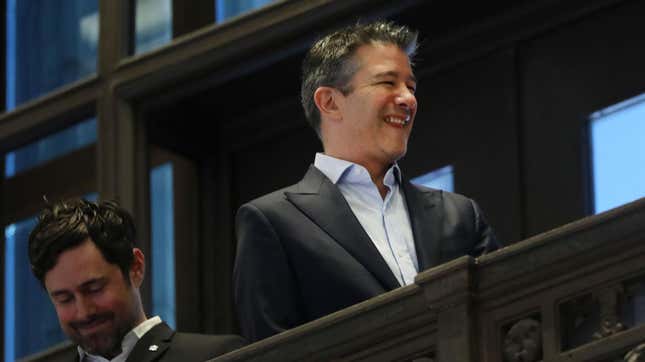
Uber spent at least half a decade breaking laws and engaging in a coordinated influence campaign to force itself into countries with tight transportation regulations, according to an explosive new report by the Guardian based on tens of thousands of Uber’s internal documents that were leaked to the news outlet.
The 124,000 files, which cover 2013 to 2017, are so extensive that they’ve been shared by the Guardian with the International Consortium of Investigative Journalists (ICIJ), which is allowing over 40 news outlets, including the Washington Post, to have access to the documents and report on them in the coming days and weeks.
The most extreme revelation from the new report by the Guardian is that former Uber CEO and founder Travis Kalanick said “violence” would “guarantee success” in its fight against French regulators in 2016 when fighting between traditional cab drivers and Uber drivers was becoming very real. Uber had encouraged its drivers to stage counterprotests to the taxi drivers, but staff at Uber warned Kalanick things could get bad.
“I think it’s worth it,” Kalanick said, according to the Guardian. “Violence guarantee[s] success. And these guys must be resisted, no? Agreed that right place and time must be thought out.”
The Guardian also suggests Uber regularly stoked controversy as a way to win public support, even if it meant Uber drivers were in the crossfire. Kalanick did not respond to an email sent late Sunday, but a spokesperson for the billionaire told the Guardian he “never suggested that Uber should take advantage of violence at the expense of driver safety.”
Reached for comment overnight, a spokesperson for Uber pointed Gizmodo to a public statement published online about “mistakes” made prior to 2017, when Kalanick was pushed out of the company and hired new CEO Dara Khosrowshahi.
“Dara rewrote the company’s values, revamped the leadership team, made safety a top company priority, implemented best-in-class corporate governance, hired an independent board chair, and installed the rigorous controls and compliance necessary to operate as a public company,” Uber said in a statement.
“When we say Uber is a different company today, we mean it literally: 90 percent of current Uber employees joined after Dara became CEO,” the statement continued.
The company also touted its work with Eric Holder, President Barack Obama’s former U.S Attorney General, who was brought in to overhaul the company’s business practices after Kalanick left.
The documents also appear to confirm that Uber executives knew what they were doing by operating in many European countries was illegal. And Uber used a “kill switch” to cut off access to the company’s main data centers whenever authorities gained access to a particular office in countries like France, India, and Belgium, among others.
The Washington Post published a story over the weekend focusing on the kill switch feature, which first became public knowledge in 2018, and the Post details Kalanick’s direct involvement in thwarting investigators. The new reporting also goes beyond what was previously known about Greyball, Uber’s internal system to make sure regulators couldn’t hail an Uber.
Ultimately, the newly leaked files on Uber expose what everyone who lives in the modern economy already knows to be true: The “gig economy” was built on the backs of workers who were taking enormous risks in many countries by operating illegally. Once those companies became dominant and squeezed out establishment players, they hiked prices because their business models simply weren’t sustainable.